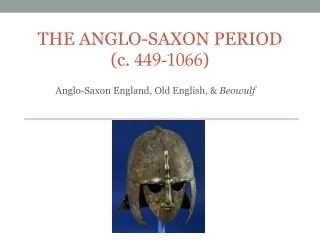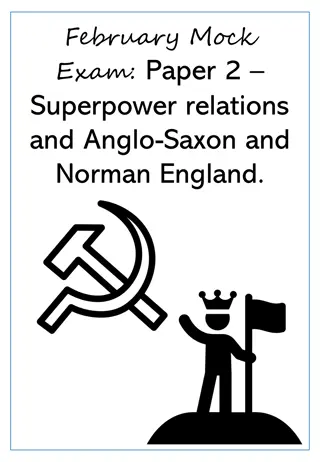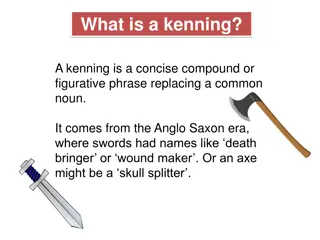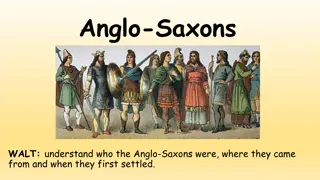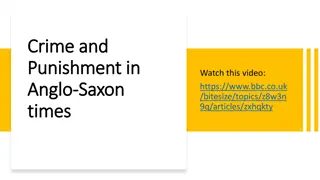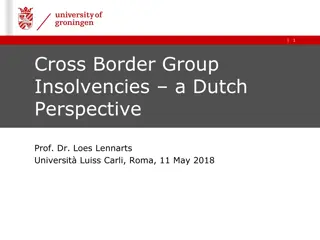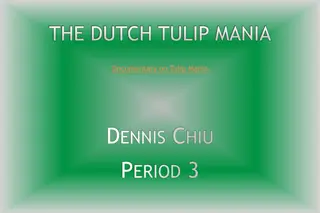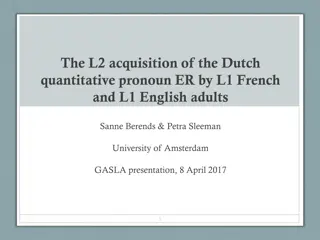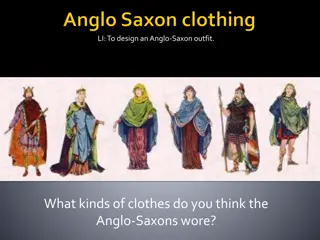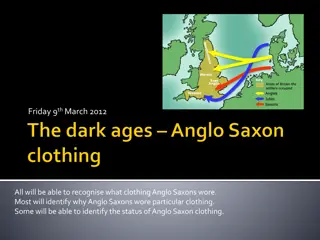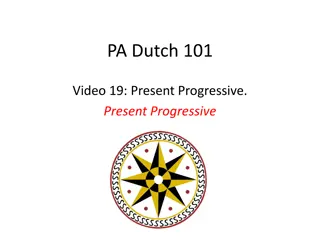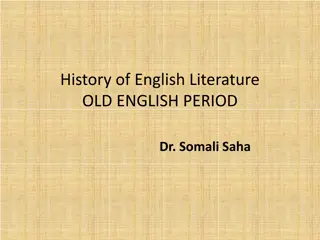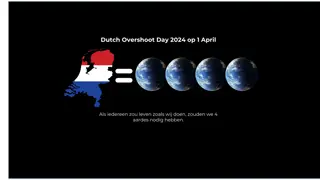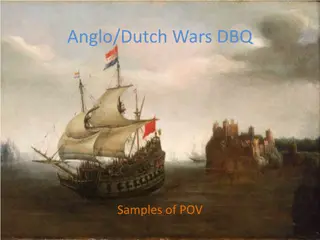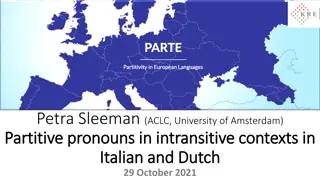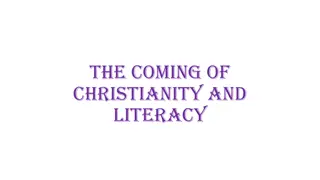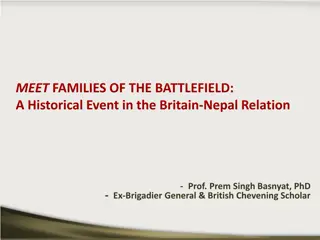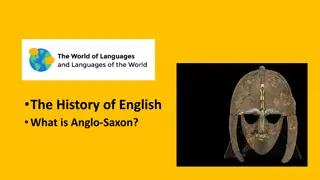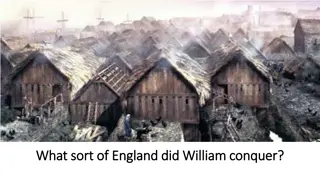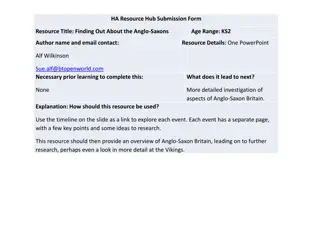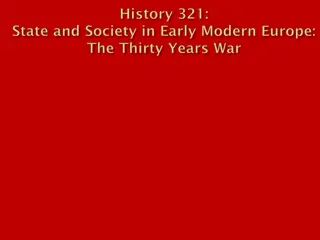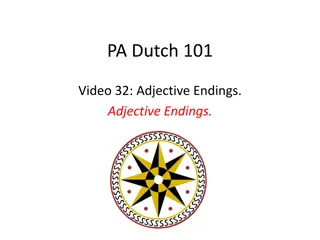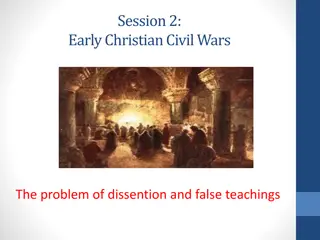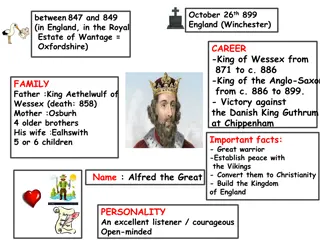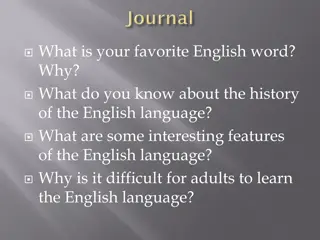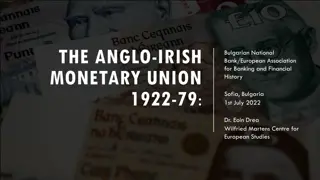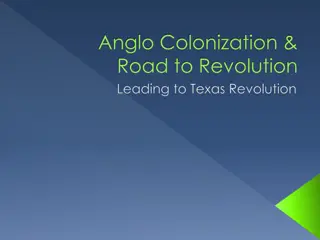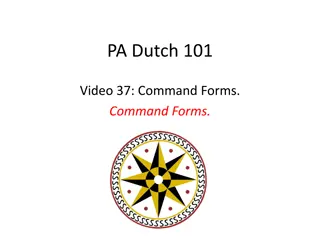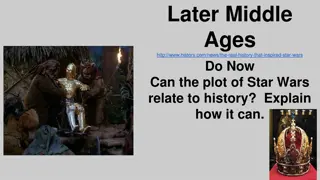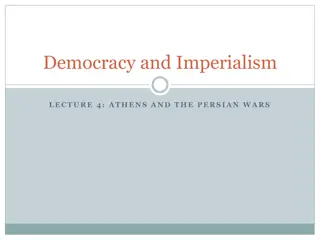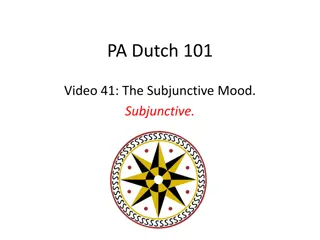The Anglo-Saxon Period: Migration and Integration in Angleland
The Anglo-Saxon period (c. 449-1066) in England saw a dynamic interplay of various cultures, including the Celts, Romans, and Germanic tribes. The arrival of Angles, Saxons, Jutes, and others led to the formation of Angleland (England), with societal structures based on heroic ideals like courage an
4 views • 20 slides
Anglo-Maratha Wars: A Historical Overview
The Anglo-Maratha Wars were a series of conflicts between the British East India Company and the Maratha Empire in India, spanning three wars from 1775 to 1818. The wars resulted in significant territorial changes and power shifts in the region, shaping the history of India during that period.
0 views • 10 slides
Anglo-Saxon, Norman England, and Superpower Relations Study Plan
Year 11 homework schedule and revision plan covering topics such as Anglo-Saxon and Norman England, Superpower Relations, Cold War events, and key historical figures. Resources include BBC Bitesize, Seneca, and GCSEPod for comprehensive study material and quizzes.
0 views • 12 slides
Life as an Anglo-Saxon Child - Insights and Imaginations
Delve into the world of Anglo-Saxon children through reflections, images, and challenges. Explore the daily life, chores, education, and pastimes through a creative diary entry challenge. Unveil the intricacies of their upbringing in an engaging and informative journey into the past.
5 views • 13 slides
Creating an Anglo-Saxon House Drawing: A Step-by-Step Guide
Explore the world of Anglo-Saxon houses through a series of activities designed to help you draw your own representation. Follow instructional videos and resources to learn various techniques like drawing 3D shapes, using vanishing points for perspective, and shading to depict different building mat
1 views • 7 slides
Kennings for Granddad - A Poetic Tribute in Anglo-Saxon Style
Dive into the ancient art of kennings with a playful tribute to Granddad, creatively capturing his everyday actions with descriptive phrases like "armchair hogger" and "history homework helper." Explore the imaginative world of figurative language reminiscent of the Anglo-Saxon era in this unique po
0 views • 4 slides
Origins and Migration of the Anglo-Saxons
The Anglo-Saxons originated from Denmark, Germany, and the Netherlands, arriving in England via wooden boats to establish themselves as warrior-farmers. This invasion led to the Angles and Saxons dominating and merging into the Anglo-Saxons, who settled in Britain for reasons such as conquest, farmi
0 views • 8 slides
Crime and Punishment in Anglo-Saxon Times
Life in Anglo-Saxon Britain (410-1066CE) involved small village living, limited urbanization, community policing, and unique forms of justice like trials by ordeal and weregild fines for crimes. The system was decentralized, with neighbors and tithings responsible for law enforcement and punishment
0 views • 8 slides
Anglo-French Conflict in Carnatic Wars: A Historical Overview
The Carnatic Wars were a series of conflicts between the British and French in India during the 18th century, fueled by commercial and colonial rivalries. The wars lasted for two decades, with battles and power struggles in regions such as Tamil Nadu and Pondicherry. The Treaty of Pondicherry in 175
0 views • 16 slides
Carnatic Wars in the 18th Century: Conflict between Indian and British East India Companies
Carnatic Wars were a series of military conflicts in the mid-18th century between the Indian Company, British East India Company, and various independent rulers. Total of three wars were fought - First Carnatic War (1746-48), Second Carnatic War (1749-1754), and Third Carnatic War (1757-1763). The w
1 views • 12 slides
Dutch Perspective on Cross-Border Group Insolvencies
This presentation by Prof. Dr. Loes Lennarts explores the Dutch perspective on cross-border group insolvencies, highlighting the lack of specific provisions in Dutch law for group insolvencies and the introduction of the draft Act on Court Confirmation of Extrajudicial Restructuring Plans (WHOA). Th
0 views • 30 slides
Dutch Tulip Mania in the 17th Century: A Historical Overview
Overview of the Dutch Tulip Mania during the 17th century, exploring the economic context, law of supply and demand, background of the tulip craze, and how tulips came to Western Europe. Includes insights on the Dutch Golden Age, the rise and fall of tulip prices, and the influence of figures like C
0 views • 20 slides
Cross-Linguistic Influence on L2 Acquisition of Dutch Quantitative Pronoun "ER
This study examines the L2 acquisition of the Dutch quantitative pronoun "ER" by L1 French and L1 English adults. It explores the syntax and semantics of using "ER" with quantifiers in Dutch, French, and English, analyzing potential cross-linguistic influences on sentence acceptance. The research hi
0 views • 22 slides
Anglo-Saxon Clothing: Design and Comparison with Modern Attire
Explore the clothing worn by Anglo-Saxons, including details on men's and women's outfits, accessories, and footwear. Learn about the similarities and differences between Anglo-Saxon attire and modern clothing styles. Get inspired to design an everyday outfit following Anglo-Saxon fashion, with a fu
0 views • 6 slides
Discovering Anglo-Saxon Clothing: Materials and Styles
Explore the clothing worn by Anglo-Saxons, including materials like wool and natural fibers, and different styles for men and women. Learn about tunics, dresses, leggings, brooches, and more. Get creative by designing your own Anglo-Saxon outfit for a party using the inspiration from historical imag
0 views • 9 slides
Learning Present Progressive in PA Dutch
Explore the concept of Present Progressive in PA Dutch through examples and practice exercises. Understand the differences between the two present tense forms and learn how to form sentences in Present Progressive. Practice translating sentences using both normal conjugation and the Present Progress
0 views • 7 slides
Overview of Anglo-Saxon Literature in Old English Period
The Old English period in English literature, dominated by the Anglo-Saxons, showcased a rich tapestry of poetic works, notable authors, and distinct dialects. Key literary features include pagan and Christian elements, as seen in epic poems like Beowulf and Caedmonian Poems. Additionally, the perio
0 views • 11 slides
Learn Pennsylvania Dutch: Telling Time in PA Dutch 101 Video
In this Pennsylvania Dutch 101 video, you will learn how to tell time in Pennsylvania Dutch. The video covers asking about the time of day, important words related to time telling, examples of telling time in PD, and a practice session. Improve your language skills and enjoy learning how to tell tim
0 views • 6 slides
Insights into Dutch-to-Afrikaans Conversion Techniques
Explore the development of a Dutch-to-Afrikaans convertor, focusing on the closely-related nature of the two languages and the potential for recycling existing technologies to aid in resource-scarce language processing. Various methods like bootstrapping and algorithm optimization are discussed, alo
0 views • 33 slides
Dutch Overshoot Day 2024: Living Like the Dutch Requires 4 Earths
Dutch Overshoot Day 2024 falls on April 1st, highlighting that if everyone lived like the Dutch, we would need 4 Earths to sustain our current lifestyle. This emphasizes the urgency for sustainable living practices to ensure a viable future for our planet.
0 views • 7 slides
Perspectives on Anglo-Dutch Wars: Documents and Views
Documents from English ambassador Sir George Downing and an anonymous pamphlet published in the Dutch Republic offer contrasting perspectives on the financial burdens and priorities during the Anglo-Dutch Wars. Sir Downing highlights the financial strain on the Dutch provinces, specifically Holland,
0 views • 26 slides
Partitive Pronouns in Italian and Dutch: A Comparative Analysis
This study explores the use of partitive pronouns in intransitive contexts in Italian and Dutch, examining their roles in both languages. The research delves into the nuances of partitive pronouns, their syntactic structures, and their interactions with direct objects and quantified adverbial phrase
0 views • 31 slides
Dutch Good Growth Fund: Financing for Development
Dutch Good Growth Fund (DGGF) is a €700 million revolving fund that provides tailored funding for sustainable and socially responsible small and medium-sized enterprises (SMEs) in low- and middle-income countries. It aims to address the financing challenges faced by SMEs, offering various financia
0 views • 9 slides
The Impact of Christianity and Literacy on Anglo-Saxon England
The arrival of Christianity in Anglo-Saxon England by missionaries led by St. Augustine brought about significant cultural and linguistic changes, including the introduction of literacy and the Roman alphabet. This transformation facilitated the spread of European culture, influencing the adoption o
0 views • 14 slides
Anglo-Nepal Relations: A Historical Perspective
Explore the historical events in the relationship between Britain and Nepal through the lens of Prof. Prem Singh Basnyat, tracing back to the beginnings of Anglo-Nepal physical relations and the Anglo-Nepal War. Discover the dynamics of power, conquest, and diplomacy that shaped the interactions bet
0 views • 33 slides
The Influence of Anglo-Saxon Language on Modern English
Explore the roots of Modern English in the Anglo-Saxon period, where Germanic tribes like the Angles, Saxons, and Jutes shaped the language, culture, and politics of the British Isles over 600 years. Discover how Old English, though different from present-day English, still influences a significant
1 views • 12 slides
Connections, Succession, and Trade: Insights into Anglo-Saxon England
Anglo-Saxon England in 1066 was a centralized, efficient kingdom vulnerable to invasion. Professor Stephen Baxter discusses the attractive nature of the society to invaders due to its centralization and wealth. The family tree of the Kings of England reveals intricate connections, successions, and a
0 views • 9 slides
Unlocking the World of Anglo-Saxons through Interactive Exploration
Delve into the fascinating realm of Anglo-Saxon England using this interactive PowerPoint resource. Explore key events, ask thought-provoking questions, and access valuable online resources to deepen your understanding. Ideal for KS2 students seeking to uncover the mysteries of this historical perio
0 views • 25 slides
European Political Landscape in the Early 17th Century
Central Europe in 1618 was marked by conflicts and power struggles among various entities such as the Bishopric of Hildesheim and the Duchy of Brunswick-Wolfenbüttel. The inability to achieve peace in 1635 and beyond was fueled by factors such as France's increasing revenue and military spending, f
0 views • 26 slides
Adjective Endings in Pennsylvania Dutch (PA Dutch 101)
Adjectives in Pennsylvania Dutch are used to describe nouns, similar to English. Depending on the situation, adjectives either follow special endings or do not take an ending. Three main situations affect adjective endings when used with definite articles, indefinite articles, or independently. Addi
0 views • 14 slides
Early Christian Civil Wars: Understanding Dissension and False Teachings
The early Christian congregations faced internal conflicts in the form of theological and leadership wars. These disputes were largely driven by personalities, as revealed in various New Testament writings. Questions for reflection are posed regarding encountering false teachings, managing civil war
0 views • 25 slides
Biography of Alfred the Great: King of Wessex and Anglo-Saxon
Alfred the Great, born in England in 847, was a renowned warrior and peacemaker who ruled both Wessex and Anglo-Saxon territories. He achieved a significant victory against the Danish King Guthrum and was known for establishing peace with the Vikings, converting them to Christianity, and strengtheni
0 views • 4 slides
Evolution of the English Language: From Celts to Anglo-Saxons
The English language has evolved from the ancient Celts through the Roman Empire and Anglo-Saxon invasions. Influences from Latin, Greek, and Germanic languages have shaped modern English. Explore the history and cultural impacts of these civilizations on the development of the English language.
0 views • 21 slides
Evolution of Irish Monetary Policy 1922-79: Economic Realities and Policy Approach
The Anglo-Irish Monetary Union saw Ireland navigate economic challenges and dependency on the UK from 1922-79. The incremental approach to currency and banking policy, along with the establishment of the Central Bank of Ireland, shaped the country's financial landscape. Key milestones included the A
0 views • 12 slides
From Anglo Colonization to Texas Revolution: A Journey Westward
Anglo Colonization and the road to revolution led to the Texas Revolution as American settlers moved west, disregarding Spanish authority and sparking conflicts. Empresarios played a role in land distribution, while figures like Augustus Magee and Bernardo Gutierrez fought for Texas independence. Tr
0 views • 18 slides
PA Dutch 101 - Command Forms
PA Dutch 101 Video 37 covers Command Forms in Pennsylvania Dutch. There are three command forms: Singular, Plural, and Lets. The choice of form depends on the number of people being addressed. The Singular Form is used for one person, the Plural Form for multiple people, and the Lets Form when sugge
0 views • 8 slides
Insights into the Middle Ages and Its Influence on Star Wars
Discover how the later Middle Ages, with its key events like the Crusades and the Hundred Years War, influenced the plot of Star Wars. Explore vocabulary terms, historical figures, and the spread of Christianity in Europe during the Middle Ages. This historical context sheds light on the societal st
0 views • 25 slides
The Impact of Athens and the Persian Wars on Democracy and Imperialism
The lecture delves into the historical events surrounding Athens and the Persian Wars, highlighting key milestones such as the expulsion of Hippias with Spartan help, Cleisthenes' reforms, and the rise of Archaic Greek imperialism in Athens and Sparta. Herodotus' perspective on the Persian Wars and
0 views • 21 slides
PA Dutch 101
Subjunctive mood in PA Dutch is used to express unreal conditions and hypothetical situations. Learn how to form subjunctive verbs, explore examples, and understand special subjunctive verbs. Discover the rules for the verb "Sei" in the subjunctive mood and how to construct If-then clauses in PA Dut
0 views • 11 slides
Present Progressive in PA Dutch
PA Dutch lesson on the present progressive form of verbs, comparing the two present tense forms in PA Dutch to English. Learn how to form and use the Present Progressive with examples, practice sentences, and instructions for creating sentences in PA Dutch. Practice translating sentences using both
0 views • 7 slides
